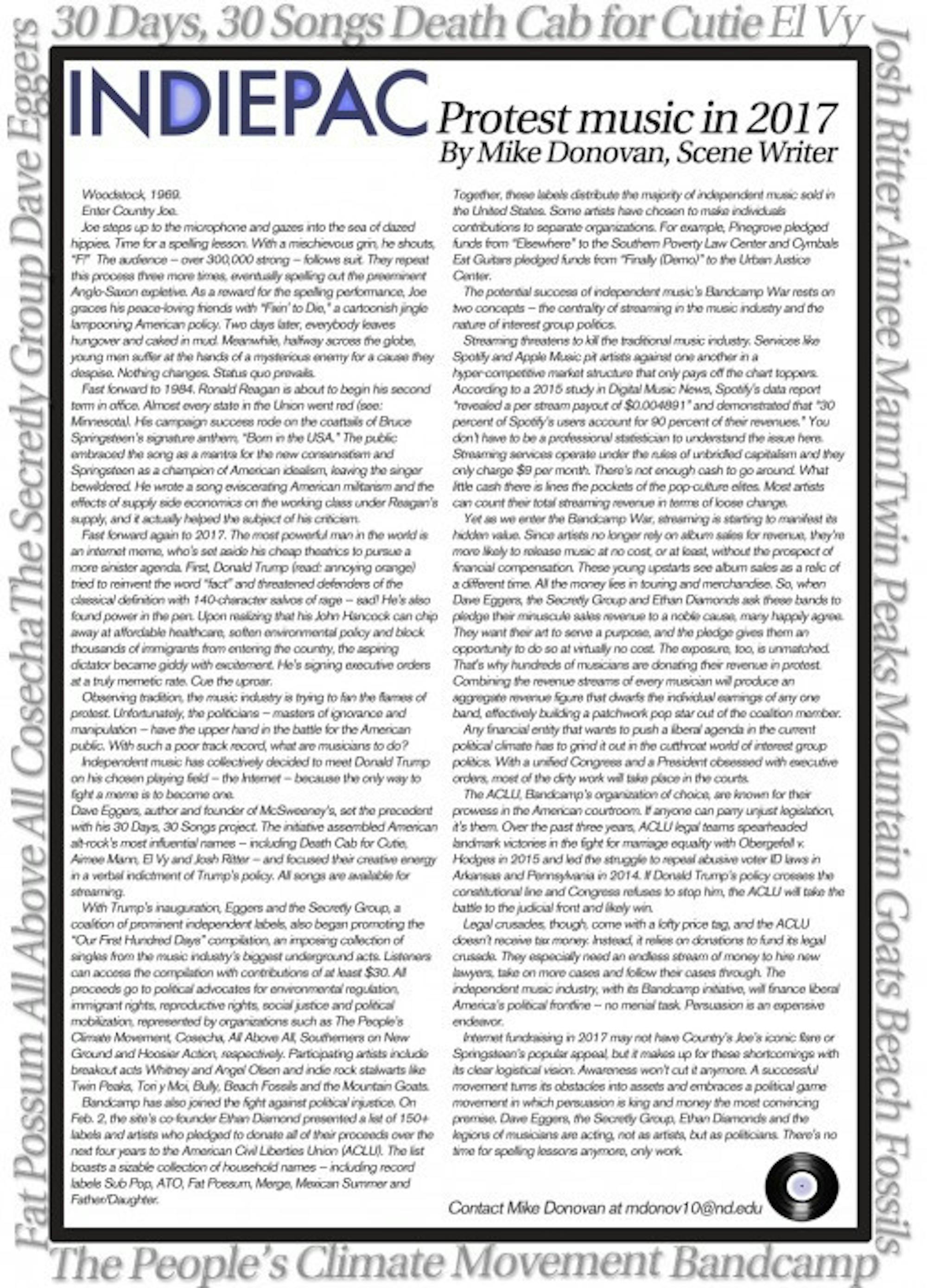
Woodstock, 1969.
Enter Country Joe.
Joe steps up to the microphone and gazes into the sea of dazed hippies. Time for a spelling lesson. With a mischievous grin, he shouts, “F!” The audience — over 300,000 strong — follows suit. They repeat this process three more times, eventually spelling out the preeminent Anglo-Saxon expletive. As a reward for the spelling performance, Joe graces his peace-loving friends with “Fixin' to Die,” a cartoonish jingle lampooning American policy. Two days later, everybody leaves hungover and caked in mud. Meanwhile, halfway across the globe, young men suffer at the hands of a mysterious enemy for a cause they despise. Nothing changes. Status quo prevails.
Fast forward to 1984. Ronald Reagan is about to begin his second term in office. Almost every state in the Union went red (see: Minnesota). His campaign success rode on the coattails of Bruce Springsteen’s signature anthem, “Born in the USA.” The public embraced the song as a mantra for the new conservatism and Springsteen as a champion of American idealism, leaving the singer bewildered. He wrote a song eviscerating American militarism and the effects of supply side economics on the working class under Reagan’s supply, and it actually helped the subject of his criticism.
Fast forward again to 2017. The most powerful man in the world is an internet meme, who's set aside his cheap theatrics to pursue a more sinister agenda. First, Donald Trump (read: annoying orange) tried to reinvent the word “fact” and threatened defenders of the classical definition with 140-character salvos of rage — sad! He's also found power in the pen. Upon realizing that his John Hancock can chip away at affordable healthcare, soften environmental policy and block thousands of immigrants from entering the country, the aspiring dictator became giddy with excitement. He's signing executive orders at a truly memetic rate. Cue the uproar.
Observing tradition, the music industry is trying to fan the flames of protest. Unfortunately, the politicians — masters of ignorance and manipulation — have the upper hand in the battle for the American public. With such a poor track record, what are musicians to do?
Independent music has collectively decided to meet Donald Trump on his chosen playing field — the Internet — because the only way to fight a meme is to become one.
Dave Eggers, author and founder of McSweeney’s, set the precedent with his 30 Days, 30 Songs project. The initiative assembled American alt-rock’s most influential names — including Death Cab for Cutie, Aimee Mann, El Vy and Josh Ritter — and focused their creative energy in a verbal indictment of Trump's policy. All songs are available for streaming.
With Trump's inauguration, Eggers and the Secretly Group, a coalition of prominent independent labels, also began promoting the “Our First Hundred Days” compilation, an imposing collection of singles from the music industry’s biggest underground acts. Listeners can access the compilation with contributions of at least $30. All proceeds go to political advocates for environmental regulation, immigrant rights, reproductive rights, social justice and political mobilization, represented by organizations such as The People’s Climate Movement, Cosecha, All Above All, Southerners on New Ground and Hoosier Action, respectively. Participating artists include breakout acts Whitney and Angel Olsen and indie rock stalwarts like Twin Peaks, Tori y Moi, Bully, Beach Fossils and the Mountain Goats.
Bandcamp has also joined the fight against political injustice. On Feb. 2, the site’s co-founder Ethan Diamond presented a list of 150+ labels and artists who pledged to donate all of their proceeds over the next four years to the American Civil Liberties Union (ACLU). The list boasts a sizable collection of household names — including record labels Sub Pop, ATO, Fat Possum, Merge, Mexican Summer and Father/Daughter. Together, these labels distribute the majority of independent music sold in the United States. Some artists have chosen to make individuals contributions to separate organizations. For example, Pinegrove pledged funds from “Elsewhere” to the Southern Poverty Law Center and Cymbals Eat Guitars pledged funds from “Finally (Demo)” to the Urban Justice Center.
The potential success of independent music's Bandcamp War rests on two concepts — the centrality of streaming in the music industry and the nature of interest group politics.
Streaming threatens to kill the traditional music industry. Services like Spotify and Apple Music pit artists against one another in a hyper-competitive market structure that only pays off the chart toppers. According to a 2015 study in Digital Music News, Spotify's data report “revealed a per stream payout of $0.004891” and demonstrated that “30 percent of Spotify’s users account for 90 percent of their revenues.” You don't have to be a professional statistician to understand the issue here. Streaming services operate under the rules of unbridled capitalism and they only charge $9 per month. There’s not enough cash to go around. What little cash there is lines the pockets of the pop-culture elites. Most artists can count their total streaming revenue in terms of loose change.
Yet as we enter the Bandcamp War, streaming is starting to manifest its hidden value. Since artists no longer rely on album sales for revenue, they’re more likely to release music at no cost, or at least, without the prospect of financial compensation. These young upstarts see album sales as a relic of a different time. All the money lies in touring and merchandise. So, when Dave Eggers, the Secretly Group and Ethan Diamonds ask these bands to pledge their minuscule sales revenue to a noble cause, many happily agree. They want their art to serve a purpose, and the pledge gives them an opportunity to do so at virtually no cost. The exposure, too, is unmatched. That's why hundreds of musicians are donating their revenue in protest. Combining the revenue streams of every musician will produce an aggregate revenue figure that dwarfs the individual earnings of any one band, effectively building a patchwork pop star out of the coalition member.
Any financial entity that wants to push a liberal agenda in the current political climate has to grind it out in the cutthroat world of interest group politics. With a unified Congress and a President obsessed with executive orders, most of the dirty work will take place in the courts.
The ACLU, Bandcamp’s organization of choice, are known for their prowess in the American courtroom. If anyone can parry unjust legislation, it's them. Over the past three years, ACLU legal teams spearheaded landmark victories in the fight for marriage equality with Obergefell v. Hodges in 2015 and led the struggle to repeal abusive voter ID laws in Arkansas and Pennsylvania in 2014. If Donald Trump’s policy crosses the constitutional line and Congress refuses to stop him, the ACLU will take the battle to the judicial front and likely win.
Legal crusades, though, come with a lofty price tag, and the ACLU doesn't receive tax money. Instead, it relies on donations to fund its legal crusade. They especially need an endless stream of money to hire new lawyers, take on more cases and follow their cases through. The independent music industry, with its Bandcamp initiative, will finance liberal America’s political frontline — no menial task. Persuasion is an expensive endeavor.
Internet fundraising in 2017 may not have Country’s Joe’s iconic flare or Springsteen’s popular appeal, but it makes up for these shortcomings with its clear logistical vision. Awareness won't cut it anymore. A successful movement turns its obstacles into assets and embraces a political game movement in which persuasion is king and money the most convincing premise. Dave Eggers, the Secretly Group, Ethan Diamonds and the legions of musicians are acting, not as artists, but as politicians. There's no time for spelling lessons anymore, only work.
IndiePAC: Protest music in 2017
Dominique DeMoe | The Observer









